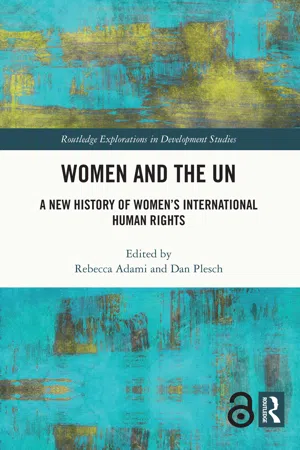
Women and the UN
A New History of Women's International Human Rights
- 174 pages
- English
- ePUB (mobile friendly)
- Available on iOS & Android
Women and the UN
A New History of Women's International Human Rights
About this book
This book provides a critical history of influential women in the United Nations and seeks to inspire empowerment with role models from bygone eras.
The women whose voices this book presents helped shape UN conventions, declarations, and policies with relevance to the international human rights of women throughout the world today. From the founding of the UN up until the Latin American feminist movements that pushed for gender equality in the UN Charter, and the Security Council Resolutions on the role of women in peace and conflict, the volume reflects on how women delegates from different parts of the world have negotiated and disagreed on human rights issues related to gender within the UN throughout time. In doing so it sheds new light on how these hidden historical narratives enrich theoretical studies in international relations and global agency today. In view of contemporary feminist and postmodern critiques of the origin of human rights, uncovering women's history of the United Nations from both Southern and Western perspectives allows us to consider questions of feminism and agency in international relations afresh.
With contributions from leading scholars and practitioners of law, diplomacy, history, and development studies, and brought together by a theoretical commentary by the Editors, Women and the UN will appeal to anyone whose research covers human rights, gender equality, international development, or the history of civil society.
The Open Access version of this book, available at
http://www.taylorfrancis.com/books/e/9781003036708, has been made available under a Creative Commons Attribution-Non Commercial-No Derivatives 4.0 license.
Frequently asked questions
- Essential is ideal for learners and professionals who enjoy exploring a wide range of subjects. Access the Essential Library with 800,000+ trusted titles and best-sellers across business, personal growth, and the humanities. Includes unlimited reading time and Standard Read Aloud voice.
- Complete: Perfect for advanced learners and researchers needing full, unrestricted access. Unlock 1.4M+ books across hundreds of subjects, including academic and specialized titles. The Complete Plan also includes advanced features like Premium Read Aloud and Research Assistant.
Please note we cannot support devices running on iOS 13 and Android 7 or earlier. Learn more about using the app.
Information
1 From women’s rights to human rights
The influence of Pan-American feminism on the United Nations
Introduction
Pan-American feminism’s equal rights treaty
Table of contents
- Cover
- Half Title
- Series Page
- Title Page
- Copyright Page
- Dedication
- Table of Contents
- Contributors
- Introductory note: Learning journey for a feminist: Making women visible, recognizing women’s achievements, and demanding power to women
- Preface: Women of the UN: Shifting the Narrative by Revealing Forgotten Voices
- Chapter 1: From women’s rights to human rights: The influence of Pan-American feminism on the United Nations
- Chapter 2: The Latin American women: How they shaped the UN Charter and why Southern agency is forgotten
- Chapter 3: Excavating hidden histories: Indian women in the early history of the United Nations
- Chapter 4: International welfare feminism: CSW navigating cold war tensions 1949
- Chapter 5: Universal human rights for women: UN engagement with traditional abuses, 1948–1965
- Chapter 6: Feminism, global inequality, and the 1975 Mexico city conference
- Chapter 7: Who wrote CEDAW?
- Chapter 8: Were children’s rights ever a feminist project?
- Chapter 9: Creating UNSCR 1325: Women who served as initiators, drafters, and strategists
- Chapter 10: Commentary: The restorative archeology of knowledge about the role of women in the history of the UN – Theoretical implications for international relations
- Index